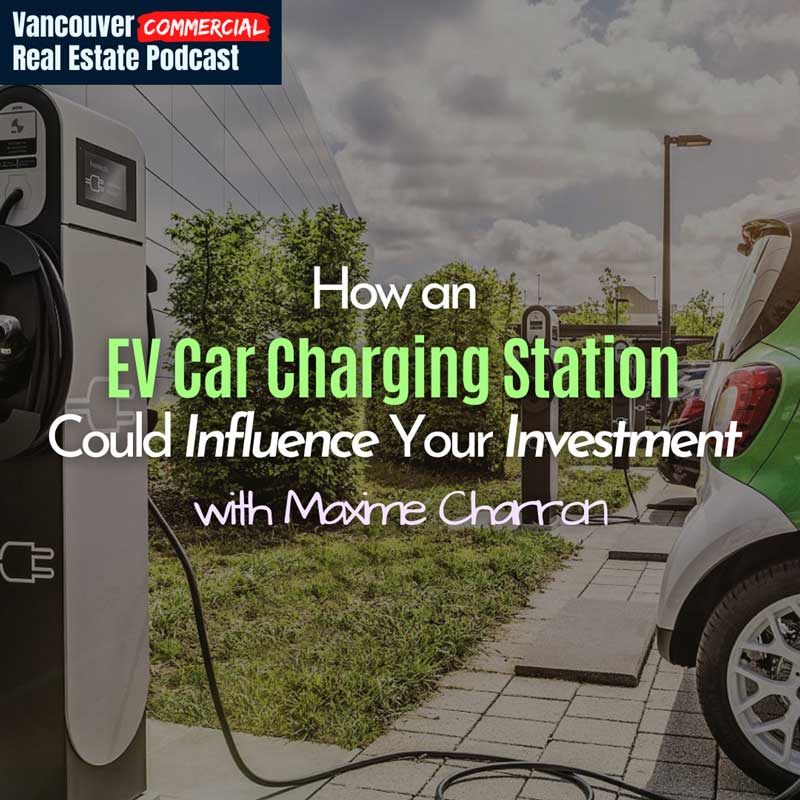
Powered by RedCircle
The world’s richest man is the founder of an electric car company and that could be foreshadowing of what’s to come. This week, Cory and Adam welcome Maxime Charron, President of LeadingAhead Energy, an industry-leading electric car charging solution provider. Max talks about how the impact that electric vehicles are having on society is causing more and more developers and commercial landlords to install EV car charging solutions on their properties. Shopping centres, industrial parks, office towers, and parking lot owners are just a few of the groups highly interested in offering car charging solutions to their customers and tenants and are building a business around this. Max discusses where he thinks the business is headed and why gas station companies are also looking at this model. Plus, tune in for Cory’s take on which market he would buy into and why!
Please tell us about yourself.
I’m French Canadian and moved out to Vancouver about 10 years ago. I wanted to find a hybrid job between sustainability and business. I founded Leading Ahead Energy five years ago to help clients through every stage of providing electric vehicle (EV) charging stations.
Who are your clients and what are they looking for when they call?
In the real estate industry, we have two to three types of clients. The first type is the developer. We work with them at the planning phase, when they engage an electrical engineer. The best way to install a charging station is to have the electrical infrastructure in place during the development stage.
The second type of clients we have are REITs. Those clients will have many buildings across the country or across the world. They want to have a nationwide or global strategy for EV charging. They have goals to have all of their spaces updated by a certain year.
The third type would be clients in the transportation space. In transportation hubs or with fleets, there’s a lot of infrastructure that can accommodate passenger vehicles. But you wouldn’t be able to charge a larger vehicle, so there’s a need for growth there.
What kind of buildings and projects do you work on?
We’re doing a lot of multi-family residential with developers for new buildings. We also do condos, but there are a lot of roadblocks with stratas. You have to do your homework with stratas to make sure there’s enough interest and a strong budget in place. You have to make sure people are aligned and wanting to pursue this type of project.
It’s never impossible for a building but the question is: At what cost? Studies showed that 80% of charging was done at home, but that was with the first wave of EV owners who were wealthier and could charge in their private garages at home. Now, the used market is coming up and the price of new EVs has dropped, so it’s not just the wealthy driving electric vehicles. Those new drivers need public charging because they don’t have private places to charge their cars at home.
I think the uptake on EVs is underestimated. Sometimes we start with a single charging station at a guest parking spot. It’s not a future-proof solution but once you have two to three stations in a complex, you see the EV uptake go up tenfold. But then the charging stations get crowded and you have a problem.
You mentioned there were a lot of shopping centres looking to get EV charging stations in their parking lots. Can you tell us more about that?
It’s the way of the future. I know a lot of people shop online but you do go to your shopping centre for certain things. There are two levels of charging stations. Level 2 provides two 40 volt chargers, similar to your stove in your house, which will charge a newer vehicle in 7-12 hours. So it’s good for just a top up while you’re out.
Level 3 is more about the decentralization of energy. The most important thing for landowners to understand is that they can become energy suppliers overnight. The most important part is the land.
Can you tell us more about the decentralization of energy?
Right now, if you want to be a fuel supplier, you need millions or billions of dollars in investment. Or, with EV charging stations, you could do it with a parking lot and a small amount of capital.
Can retailers put charging stations in areas that aren’t as busy to try and increase the traffic there?
Definitely. The return on investment in a charging station will make sense in 3-5 years. But it’s important to be first. Everyone has a routine. People will go to the charging hubs that have enough stations, and that are convenient to where they live, shop or eat. It’s definitely an attraction that can bring people to your site.
How is this impacting design in commercial real estate?
The regulations in commercial are not as strict as in residential. And it varies by municipality. Developers understand it’s an attraction for tenants, so they’re trying to put them in right away.
If I own a strip centre on a power grid that’s maxed out, what can I do?
Typically in commercial, there’s always room for Level 2 chargers. They don’t consume that much power. If you want a fast charger that can charge a vehicle in 20-40 minutes, you might need a new service with BC Hydro. It will cost more but there is a grant through Clean BC which can fund the project up to 50%.
What are some of the grants and incentives offered?
In BC you have a mix of grants, mostly for retrofitting condos and for developing offices. You always have to be pre-approved for the grant. You’ll apply, get a quote from a company like ours and then receive $1400-2000 per Level 2 port. For Level 3, we’re talking about $50,000-80,000 per charging station.
When should owners be getting on top of this?
We’re biased but we think people should get on this as soon as possible. We don’t know how long the government grants will last for – it’s not every day you can get a 50% discount on a project.
By doing it sooner, you’ll also be the focus point at the beginning of an era. When free wifi first started, everyone flocked to Starbucks, and that’s how they grew in popularity. And now everyone has free wifi. So first come, first serve applies. If you’re the last person doing it, it doesn’t make a statement.
Is there enough power in the world to support all of us owning electric cars?
In BC, we’re lucky enough that there is enough power. Will the grid be able to take it? That’s another story. You may have to update the transformers but it’s not impossible. Our country has had to do much bigger projects. It’s just about changing the infrastructure. But we aren’t going to run out of power.
What does the future look like for EV charging?
BC Hydro has put out a lot of chargers. I hope they’re getting up to speed with the technology in the vehicles. The first generation of EVs had a 30 KW battery pack. With a 50 KW charging station, it took 25-30 minutes to charge your vehicle. But BC Hydro continues to install 50 KW charging stations when new vehicles are 70 KW. So your charging time has now gone up to 90 minutes. Electrified Canada is the most reliable network in Canada providing decent charge for vehicles within 20-40 minutes.
BC Hydro has a lot of chargers at Superstore locations and they’re doing their best along highways. But those stations are not future proof if the technology is already antiquated.
How do landowners make money with EV charging stations?
There are three ways you can make money. First, you can’t resell electricity but you can sell time; you can charge people per minute or per hour to use the station. The second way is data. A charging station provides a lot of data when people sign up with an app. That’s not something to take lightly. Third, it brings more people in. You have more traffic, it attracts anchor tenants, and you have more revenue.
What advice would you give someone who wanted to get into the car charging business?
Find an EV charging station infrastructure expert to work with. Whether it’s us or someone else, don’t just deal with one vendor who can’t future proof your site. We know technology is evolving rapidly and that one vendor might not be the right fit for your needs.
Find out more:
leadingaheadenergy.com
linkedin.com/in/charronmaxime
For all the curious minds interested in commercial real estate investing, grab a coffee and pull up a chair because we have exclusive stories and tips from commercial real estate brokers, investors, developers, economists, urban planners, and everyone in-between. From the successes and failures to the motivations and lessons learned, the Vancouver Commercial Real Estate Podcast is your insight into commercial real estate in Vancouver, Victoria, Kelowna, and beyond.
What's the best real estate market to invest in? What are the commercial real estate asset classes and property types? Hosted by Cory Wright, founder of William Wright Commercial, and co-hosts Adam and Matt Scalena of the Vancouver Real Estate Podcast, our podcast opens the door to real estate investing for everyone from beginner investors to experienced real estate professionals. New episodes are released every Tuesday. Follow the Vancouver Commercial Real Estate Podcast on Apple Podcasts, Spotify, Google Podcasts, or your favourite streaming platforms.

This communication is not intended to cause or induce breach of an existing agency agreement. E&OE: All information contained herein is from sources deemed reliable, and have no reason to doubt its accuracy; however, no guarantee or responsibility is assumed thereof, and it shall not form any part of future contracts. Properties are submitted subject to errors and omissions and all information should be carefully verified. All measurements quoted herein are approximate.
ⓒ William Wright Commercial Real Estate Services 2024
Proudly designed by Burst Creative